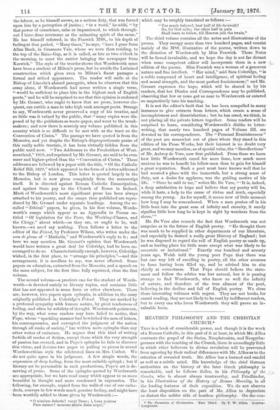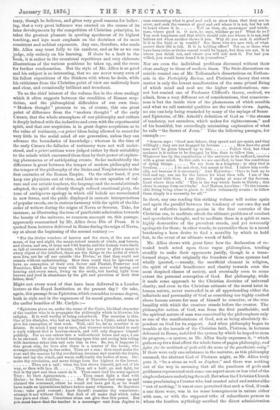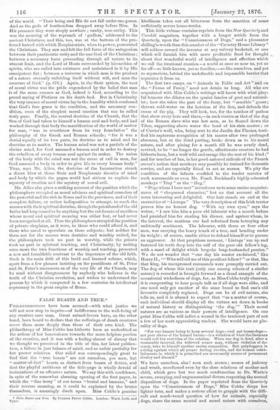HEATHEN PHILOSOPHY AND THE CHRISTIAN CHURCH.*
Tars is a book of considerable power, and though it is the work of a Roman Catholic, in this part of it at least, in which Mr. Allies contrasts the gospel of the Stoics, Neoplatonists, and Neopytha- goreans with the teaching of the Church, there is exceedinglylittle in which other believers in divine revelation will be prevented from agreeing by their radical differences with Mr. Allies as to the criterion of revealed truth. Mr. Allies has a learned and candid as well as a subtle mind. His knowledge of the chief German authorities on the history of the later Greek philosophy is remarkable, and he follows Zeller, in his Philosophy of the Greeks, who is almost always trustworthy, and Friedlander, in his Illustrations of the History of Roman Morality, in all the leading features of their exposition. We do not observe the least disposition on the part of Mr. Allies to depreciate or distort the nobler side of heathen philosophy. On the con- 0 nimium delecta! vocat Dens ; i, bona nostrae • The lirmotion of Christendom. Part Third. By T. W. Allies. London:
trary, though he believes, and gives very good reasons for believ- ing, that a very great influence was exerted on the course of its later developments by the competition of Christian principles, he takes the greatest pleasure in quoting specimens of its highest teaching, and lays most emphasis on the doctrines of its most consistent and noblest exponents. Any one, therefore, who reads Mr. Allies may trust fully to his candour, and as far as we can • judge, rely entirely on his learning. If there be a fault in the book, it is rather in the occasional repetitions and very elaborate illustrations of the various positions he takes up, and the room for further condensation. But the style of Mr. Allies is so good and his subject is so interesting, that we are never weary even of his fullest expositions of the thinkers with whom he deals, while his criticisms from the Christian point of view are uniformly keen and clear, and occasionally brilliant and trenchant.
To us the chief interest of the volume lies in the close analogy which it often suggests between the condition of Roman scep- ticism, and the philosophical difficulties of our own time.
"Modern thought" presents to us, of course, this one great point of difference from the "modern thought" of the early
Caesars, that the whole atmosphere of our philosophy and culture is deeply imbued with the inductive and even with the experimental spirit, and that our scepticism is in great degree scepticism as to the value of testimony,—a priori ideas being allowed to count for very little in the social mind of our generation, unless they can
advance the boundaries of knowledge ; whereas in the time of the early Caesars the fallacies of testimony were not well under- stood, and a priori notions were judged rather by their suitability to the minds which canvassed them than by their power of explain- ing phenomena or of anticipating events. So far undoubtedly the difference is great between the temper of modern philosophy and the temper of the philosophy of the Stoics and Neoplatonists in the first centuries of the Roman Empire. On the other hand, if you keep our physicists out of view, and look to our apostles of cul- ture and our artistic teachers, the language and the mental attitude adopted, the spirit of cloudy though refined emotional piety, the tone of ambiguous apology in which old beliefs are resuscitated in new forms, and the pride displayed in esoteric interpretations of popular creeds, are in curious harmony with the spirit of the like order of writers during the reigns of Nerve or Severus. Take, for instance, as illustrating the tone of pantheistic admiration towards the beauty of the universe, so common amongst us, this passage, apparently summarised by Mr. Allies from Dio of Prusa. It is quoted from lectures delivered in Rome during the reign of Nerva, say at about the beginning of the second century :—
" For the divine wonders of heaven and the stars, of the sun and moon,- of day and night, the many-voiced sounds of winds, an forests, and rivers, and sea, of tame and wild beasts, and the human voice itself, so full of sweetness and of beauty, which has power to give a name to every object of the intellect, these are the things in the midst of which men live, not far off nor outside 'the Divine,' so that they could not remain without understanding. How then could they be ignorant or have no conception of their own Sower and Planter, Preserver and Nourisher, filled as they were with the divine nature by seeing and hearing and every sense, living on the earth, but having light from heaven and food in abundance by the gift and provision of their first father, God."
Might not every word of that have been delivered in a London lecture at the Royal Institution at the present day ? Or take, again, this passage from Epictetus, which resembles to some degree, both in style and in the vagueness of its moral grandeur, some of the earlier homilies of Mr. Carlyle :-
"Epictetus gives us, under the name of the Cynic, his ideal character of the teacher who is to propagate the philosophy which is likewise his religion. It is well worthy of being considered. The occasion is this. One of his disciples, who had an inclination to be a Cynic, asked him to give his conception of that work. Well, said he, let us consider it at leisure. So much I may say at once, that whoever sets his hand to such a work without God is heaven-struck, and will only disgrace himself publicly. For no one enters into a well-ordered house and says, I am to be steward. Or else its lord turning upon him and seeing him ruling with insolence takes him and cuts him in two. So, too, it happens in this great city, for here also there is a master of the house, who arranges everything in due order. Thou art a sun : thou canst make the year and the seasons by thy revolutions, increase and nourish the fruits, raise and lay the winds, and warm sufficiently the bodies of men. Go: make thy revolution, and move things from the highest to the lowest.
Thou art a calf: when the lion shows himself, get out of his way, or thou wilt fare ill. Thou art a ball : go and fight, for this is thy part and thou canst do it. Thou canst lead the army against Troy : be thou Agamemnon. Thou canst fight a duel with Hector : be thou Achilles But if Thersites had come up and claimed the command, either he would not have got it, or he would have made an ignominious failure before many witnesses. So therefore thou: take good counsel : know thyself: examine thy conscience: attempt it not without God. But first of all make that which rules thee pure and clear. Conscience alone can give thee this power. But you must know that the teacher is a messenger sent from Jupiter to men concerning what is good and evil, to show them that they are in error, and seek the essence of good and evil where it is not, but lay not
to heart where it is Tell us then, sir, messenger and watch- man, where good is. 0 men, he says, whither go ye ? What do ye ? You seek happiness and that which should rule you where it is not, and believe not when another shows it you. Why do you seek it without? Is it in the body or in wealth ? See those who are now rich, of what sorrow their life is full. It is in holding office? Not so, or those who have been twice or thrice consul would be happy, but they are not. It is where you think not, and where you will not seek it. For had you willed, you would have found it in yourselves."
Nor are even the individual problems discussed without their close analogy to those of modern times. The Stoic discussions on suicide remind one of Mr. Tollemache's dissertations on Euthan- asia in the Fortnightly Review, and Plotinus's theory that even matter is only the lowest manifestation of the same primal Being of which mind and soul are the higher manifestations, can- not but remind one of Professor Clifford's theory, evolved, we admit, from a very different set of considerations, that conscious- ness is but the inside view of the phenomena of which sensible and what we call material qualities are the outside views. Again, no one can help being reminded by many of the sayings of Seneo and Epictetus, of Mr. Arbold's definition of God as " the stream of tendency, not ourselves, which makes for righteousness," and of his beautiful, but exceedingly minimising explanation of what he calls "the Secret of Jesus." Take the following passages, for example :— " Seneca says : 'Good men labour, they spend and are spent, and that
willingly ; they are not dragged by fortune How does the good man act? he gives himself up to fate Follow God, but what madness is it rather to be dragged by him than to follow him Whatever has by the constitution of the universe to be suffered, receive with a great mind. To this oath we are enrolled, to bear the conditions of dying things We are born in a kingdom : to obey God is freedom I do not obey, but assent to God. I follow him cordi- ally, not because it is necessary.' And Epictetns : 'Dare to look up to• God and say, use me for the future for what thou wilt. I am of the same mind with thee. I am thine. I repine at none of thy decrees. Lead where thou wilt." This is the way which leads to liberty ; this alone is escape from servitude.' And Marcus Aurelius: ' To the reason- able living being alone is given to follow voluntarily events : to follow them simply is a necessity for all' "
In short, any one reading this striking volume will notice again and again the parallel between the tendency of our own day and that of reflective heathen genius in the first centuries of the Christian era, to meditate afresh the ultimate problems of conduct and speculative thought, and to meditate them in a spirit at once highly destructive of the prevalent creeds, and yet reverently apologetic for them ; in other words, to reconsider them in a mood betokening a keen desire to find a morality by which to hold fast, in the event of an ultimate wreck of faith.
Mr. Allies shows with great force how the declaration of re- vealed truth acted upon these vague philosophies, tending steadily to make their opponents justify, though in a trans- formed shape, what originally the founders of those systems had wholly ignored, — namely, the sacrificial element in religion, the spirit of social beneficence and charity towards even the most despised classes of society, and eventually even to some extent the personal conception of God. But philosophy, while it made some approach to the Christian doctrine of universal charity, and even to the Christian estimate of the moral taint in human nature, never succeeded in at all apprehending either the infinitude and personality of God as something too highly exalted above human nature for man of himself to conceive, or the true humility with which the creature stands before the creator. The philosophic notion of God, was from the first pantheistic, and the spiritual nature of man was conceived by the philosophers only as one of the manifestations of God, not as being absolutely de- pendent on God for its support. And when philosophy began to tremble at the inroads of the Christian faith, Plotinus, in lectures delivered in Rome, unfolded the system by which he hoped to stern its progress,—a system, as Mr. Allies finely expresses it, " which gathers up fora final effort the whole force of pagan philosophy, and fights for the multitude of gods with the arms of the pantheistic unity.' If there were only one substance in the universe, as this philosophy assumed, the abstract God of Plotinus might, as Mr. Allies truly puts it, "be a stone as well as Jupiter," and there was nothing out of the way in assuming that all the pantheon of gods and goddesses represented each some one aspect more or less vital of the single substance underlying them all. But when the Christian Church came proclaiming a Creator who had created mind and matteralike " out of nothing," it was at once perceived that such a God, if such a one there were, was in no sense homogeneous in nature either with man, or with the supposed tribe of subordinate powers to whom the heathen mythology ascribed the direct administration of the world. " Their being and His do not fall under one genus. And so the gods of heathendom dropped away before Him. In His presence they were simply nowhere ; vanity, non-entity. This was the meaning of the reproach of godless,' addressed to the ancient Christians, and this, too, was at the bottom of the pro- found hatred with which Neoplatonists, when in power, persecuted the Christians. They saw and felt the full force of the antagonism between their pantheistic unity and the one God of the Christians ; between a necessary force proceeding through all nature to its utmost limit, and the Lord of Hosts surrounded by hierarchies of spirits, who are called into existence and maintained in it by His omnipotent fiat ; between a universe in which man is the product of a nature eternally unfolding itself without will, and man the creature of God." (p. 376.) Again, in the Stoic system, the root of moral virtue was the pride engendered by the belief that man is of the same essence as God, indeed is God, according to the proud saying of Plotinus on his death-bed. But in Christianity the very essence of moral virtue lay in the, humility which confessed that God's free grace is the condition, and the necessary con dition, even of the simplest moral emotion that can be called truly pure. Finally, the central doctrine of the Church, that the Son of God had taken to himself a human soul and body, and had worked through that body the sanctification of the world of matter for man, "was to overthrow from its very foundation" the philosophy of the Greek and Roman schools ; "for it was a denial equally of its two parts, its doctrine as to mind and its doctrine as to matter. The human mind was not a particle of the divine mind, for God assumed a human soul in order to destroy the rebellion of every human soul against its maker. The union of the body with the mind was not the cause of evil in man, for God assumed a body in order to give life to every human body." Thus, says Mr. Allies, the doctrine of the Incarnation struck a direct blow at those Stoic and Neoplatonic theories of mind and body by which the pagan world had striven to explain the mystery of creation and the mystery of moral evil.
Mr. Allies also gives a striking account of the position which the philosophers occupied as moral advisers and spiritual consolers of the powerful and the rich in Rome and in the provinces, and of their complete failure, or rather indisposition to attempt, to reach the masses with their spiritual doctrine, though the priesthood of the old faiths had long ceased to be anything but the celebrants of sacrifices whose moral and spiritual meaning was either lost, or had never been recognised, at all. Thus the philosophers occupied the position of private chaplains, as it were, to those who could afford it, and those who cared to speculate on these subjects ; but neither for them nor for the masses were doctrine and worship united, for the philosophers took no part in worship, while the priests took no part in spiritual teaching, and Christianity, by uniting once more the two functions of worship and teaching, presented a new and formidable contrast to the impotence of the old faith. Such is the main drift of this lucid and learned volume, which, apart from a few phrases insisting on the pontificate of St. Peter and St. Peter's successors as of the very life of the Church, may be read without disagreement by anybody who believes in the truth of the Christian revelation, and wishes to understand the process by which it conquered in a few centuries its intellectual supremacy in the great empire of Rome.




































 Previous page
Previous page